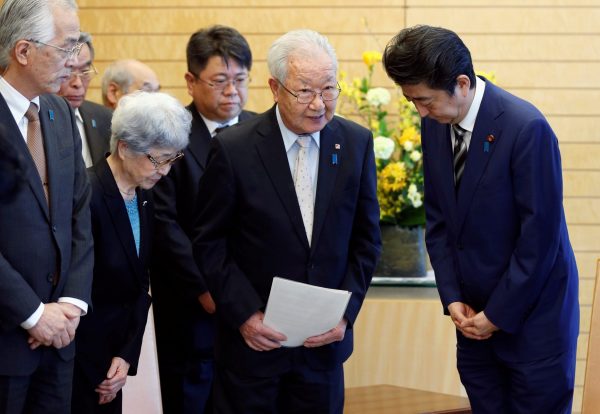Japanese fears about getting sidelined from developments on the Peninsula have deepened with the recent spate of summits. Since April 2018, North Korean leader Kim Jong-un has met multiple times with the presidents of South Korea and China, and once with US President Donald Trump. Backed by more than 80 per cent of Japanese respondents, Japanese Prime Minister Shinzo Abe seeks a similar summit with Kim Jong-un, possibly in September.
Despite this anxiety about getting left out, the recent summitry has ameliorated some of Japan’s core security concerns. Going forward, how the agreements from the summits are implemented matters greatly for Japan. Tokyo’s three main concerns are North Korea’s abductions of Japanese nationals in the 1970s and 1980s, North Korea’s missiles and North Korea’s nuclear program. Abe welcomed the Trump–Kim summit in Singapore on 12 June as ‘a step toward the comprehensive resolution of various issues’. This phrase refers to Japan’s policy objective of resolving its three core concerns about North Korea.
As signalled by the blue ribbon always on his lapel, Abe cares about the abductions issue. In 2002, he was part of the Japanese delegation that heard former North Korean leader Kim Jong-il admit North Korean involvement in 13 Japanese nationals’ abductions. But progress since then has been slow. Only 5 of the 17 abductees recognised by Tokyo have been returned to Japan. And a 2014 agreement Abe’s government reached with Pyongyang to investigate the others’ whereabouts remains suspended.
Abe hoped Trump would raise the issue in Singapore. At a press conference after the summit, Trump assured the world that he ‘absolutely’ raised the abductions issue, and that ‘we didn’t put it down in the document, but it will be worked on’. The US Ambassador to Japan — wearing the blue ribbon lapel pin when interviewed — later said Trump had raised the issue twice. Since the abductions are not a top US priority, Tokyo is pursuing its own talks with the North.
North Korea has abducted or detained other countries’ nationals, including about 4000 South Koreans, of whom 516 are still missing. Seoul shelved this and other human rights issues in talks with Pyongyang, but succeeded in restarting the reunions of families separated by the Korean War. Meanwhile, Washington persuaded Pyongyang to release the three US detainees in May 2018.
A similar outcome for the remaining Japanese abductees is unlikely. While one of the only areas of tangible progress since the Trump–Kim summit is the still-delayed repatriation of US servicemen’s remains from the Korean War, making such humanitarian gestures with regards to Japanese abductees is riskier for Pyongyang. Renewed criticism of Japan suggests that Pyongyang also considers the potential gains with Tokyo to be less attractive than better relations with Washington.
There are also signs that the Japanese public’s priorities are changing. In a Cabinet Office survey in late 2017, citizens’ interest in North Korea’s missiles overtook the abductions for the first time since the question was introduced in 2000. And the proportion of respondents who were interested in the nuclear program rivalled those interested in the abductions (the latter figure stands at 78.3 per cent, which is the lowest since 2002). A recent opinion poll also found that more than two-thirds of Japanese respondents doubt that the missile, nuclear, and abductions issues will be solved.
North Korea declared it would not conduct nuclear and missile tests while talks with the United States were ongoing. And although the Trump–Kim joint statement does not mention missiles and satellite imagery indicates virtually no changes to missile facilities, Trump claimed that Kim Jong-un was ‘already destroying a major missile engine testing site’. North Korea previously observed several self-imposed moratoriums on longer-range missile testing from 1999–2006. In recognition of the easing of tensions amid recent summits, the Japanese government announced that it would suspend missile evacuation drills.
North Korean denuclearisation, which has yet to begin, is also in Japan’s security interests. Japan expressed willingness to financially and technically aid denuclearisation. Considering the North’s development of nuclear and missile development in the past two decades and lingering questions about abductees’ fate, Tokyo may attach more strings to aid than when it promised in 2002 to provide economic assistance after normalising relations or when it funded nearly a quarter of the Korean Peninsula Energy Development Organization in the 1990s. For instance, Abe called for a multilateral consortium into which Japanese funds could go to avoid sending money directly to North Korea.
Tokyo is likely to remain cautious. Washington assured Japan that the US–South Korea joint military exercises’ cancellation is reversible. But North Korea has incentives to keep South Korea, the United States and Japan divided. A North Korean diplomat in Geneva recently warned Tokyo ‘to refrain from poking into others’ business’.
Kim Jong-un’s approach to diplomacy is characterised by more dramatic policy swings than his father’s approach, and his mind can change quickly. Trump’s approach to foreign policy is similarly mercurial. In sticking by Trump, Abe has had to adopt contradictory positions. He expressed support for the Trump–Kim summit, its cancellation and its resumption. Pyongyang might conclude that Tokyo has no strategic vision for Japan’s policy toward North Korea.
As Japan seeks to remain relevant to developments on the Korean Peninsula, it may have little choice but to adopt a reactive approach and pursue its own interests when it can. The main concern for Japan in the coming months is how the US–North Korea agreement — really a half-baked document lacking much substance — will be fleshed out in follow-up negotiations and implemented alongside the more substantive North–South agreement reached in April. US Secretary of State Mike Pompeo’s recent trip to Pyongyang indicates a long and bumpy road ahead.
Celeste L Arrington is Korea Foundation Assistant Professor of Political Science and International Affairs at the George Washington University.
Atsuhito Isozaki is an Associate Professor of North Korean Studies at Keio University.

